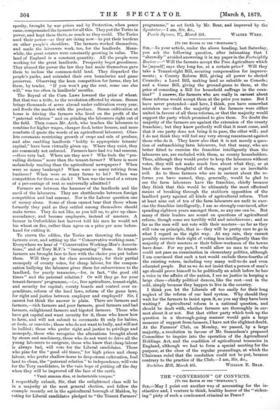[TO THE EDITOR OF THE " SPECTATOR.1
SIR,—In your article, under the above heading, last Saturday, you ask the following question, after intimating that I "shrewdly" avoided answering it in my paper in the Fortnightly Review :—"Will the farmers accept the Free Agriculture which he [myself] says they long for, at a certain price? Will they take a Tenant-right Bill, securing compensation for improve- ments; a County Reform Bill, giving all power to elected Councils ; a Land Bill, making land as saleable as Consols ; and a Game Bill, giving the ground-game to them, at the price of conceding a Bill for household suffrage in the coun- ties?" I answer, the farmers who are really in earnest about these reforms would accept them at the price you name. But I have never pretended—and here, I think, you have somewhat mistaken me—that -the majority of the farmers were either united in favour of all these reforms, or that the majority would support the party which promised to give them. No doubt the majority of the farmers are against the extension of the county franchise; but they know perfectly well that it must come, and that if one party does not bring it to pass, the other will; and I do not think they will feel any very strong resentment against those who do it. They know also that it is not merely a ques- tion of enfranchising farm labourers, but that many, who are better fitted to exercise the franchise intelligently than the labourers are, are excluded with them, as county householders. Thus, although they would prefer to keep the labourers without votes, they will not make much fuss about what they, or at least the more thoughtful of them, regard as an inevitable evil. As to those farmers who are in earnest about the re- forms you have named, they, generally, would be glad to see the farm labourers have the franchise, chiefly because they think that this would be ultimately the most effectual means of breaking through the stubborn opposition of the landlord party against all kinds of agricultural reform. That at least nine out of ten of the farm labourers are unfit to exer- cise the franchise intelligently, I am as strongly convinced, after spending eighteen years amongst them, as any one can be. But many of their leaders are sound on questions of agricultural reform, though some are terribly wild and mischievous ; and as far as the men will not vote with their masters—as far as they will vote on principle, that is—they will be pretty sure to go in what I regard as the right way. At any rate, they cannot possibly exercise their right of voting less intelligently than the majority of their masters or their fellow-workmen of the towns have done. For my past, I would allow no man to vote who could not pass an examination in elementary politics, although I am convinced that such a test would exclude three-fourths of the existing voters, including very many well-to-do and even educated people. But as we do not insist that a person of man's age should prove himself to be politically an adult before he has a voice in the affairs of the nation, I see no justice in keeping a large class—chiefly political dunces, like the rest—out in the cold, simply because they happen to live in the country.
I think you let the Liberals off too easily for their long neglect of the reform of our land system. Why should they wait for the farmers to insist upon it, as you say they have been waiting ? Agricultural reform is a national question, and should be dealt with, whether farmers are thoroughly in ear- nest about it or not. But that either party which took up the question in a thorough-going manner would gain a large measure of support from farmers, I have not the slightest doubt. At the Farmers' Club, on Monday, we passed, by a large majority, a resolution in favour of Mr. Samuelson's proposed Committee to inquire into the operation of the Agricultural Holdings Act, and the condition of agricultural tenancies in England, although we had to form a special meeting for the purpose, at the close of the regular proceedings, at which the Chairman ruled that the resolution could not be put, because contrary to the practice of the Club.—I am, Sir, ttc.,


































 Previous page
Previous page